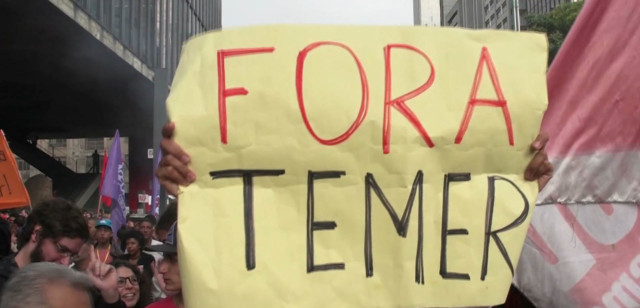When Brazilian President Michel Temer took office last summer, he promised to push through tough reforms to get the country out of recession.
His plans centered around unpopular changes to the pension system. With political scandal now swirling around him, does he have the power to see the reforms through?
CGTN’s Paulo Cabral reports from Sao Paulo.
It’s been a rough ride for Brazil these last couple of years, a perfect storm of political and economic crises, fueling continual street protests and a growing divide in society.
President Michel Temer’s unpopular economic reform plan – mainly changes to the pension system and labor laws – is a key flashpoint in the crisis.
The government wants to increase the minimum age for retirement to maintain social security for the future, and make the country’s labor laws more flexible, to reduce companies’ costs to hire and fire workers – and make them more competitive.
The reforms have strong support from financial markets, the business community and most economists.
But are fiercely opposed by leftist parties, social movements and trade unions.
“The government is attacking the people from all flanks. It’s not only the pension system reform but also the changes they want to make to labor laws that will put workers in the condition they were more than one hundred years ago,” said João Cayres, Secretary-General of Unified Workers Central.
This former Brazilian ambassador to the U.K. and the U.S. said the reforms are needed to boost prospects for long term investment in Brazil.
“Brazil is a big market economy. Brazil is one of the ten biggest economies in the world. If we approve those reforms and if we grow this year I think that confidence for foreign investors and local investors, Brazilian investors will grow. Now there’s a wait and see attitude,” said Rubens Barbosa, Former Brazilian Ambassador.
To see his most important reforms approved, President Michel Temer needs a two-thirds majority in Brazil’s Parliament – the National Congress – in order to change the Constitution. As Temer fights for his political survival, he may not be strong enough to achieve this.
Since an alleged tape recording swept Temer into the massive “Car Wash” corruption probe – there have been calls for his resignation or impeachment — and his approval ratings are down to the single digits.
“At this moment the president lives a situation that is like a dog following its own tail. That is, he needs to demonstrate force passing the reforms, but he needs to be strong to pass the reforms. So we don’t know what comes first,” Claudio Couto, political scientist at Getulio Vargas Foundation said.
It’s not clear how much power or time remains for President Temer. Pushing forward with reforms may be his best move even if risky and unpopular.
 CGTN America
CGTN America

